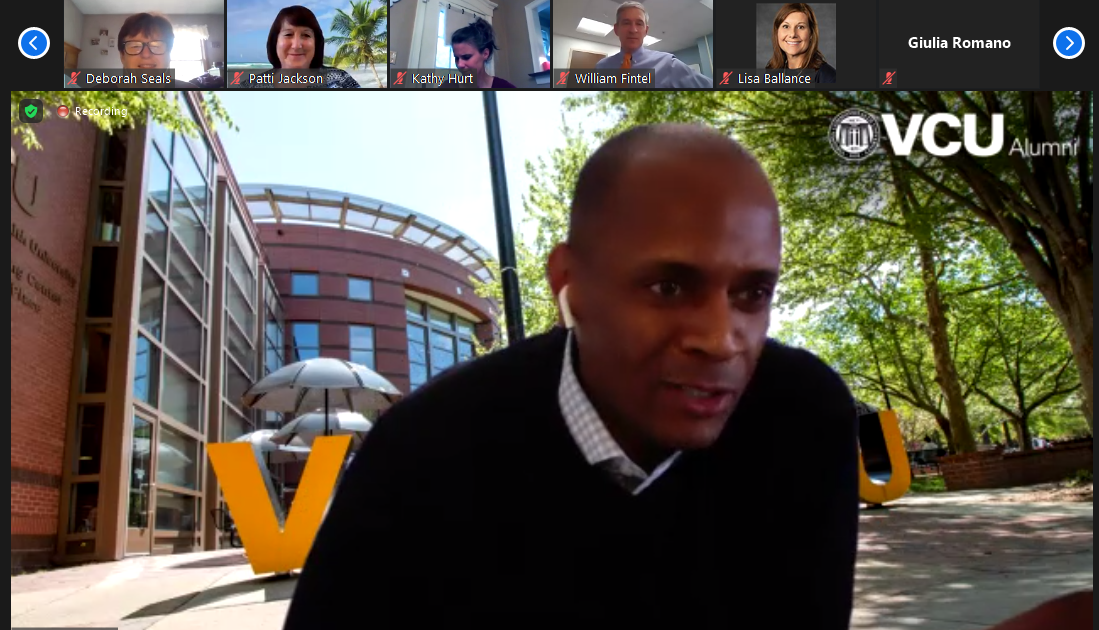“We’ve got work to do”: Health Equity series explores lung disease disparities

This year, COVID-19 has disproportionately attacked the lungs of Black and Latino people. But inequities in lung health are nothing new to researchers, patients and health care providers in minority communities. 
Those lung health disparities were front and center on Tuesday for Black Lives, Black Lungs, when attendees from Virginia Commonwealth University, VCU Health and the Virginia community joined lung health experts for presentations on the latest research and a conversation about paths forward.
Hosted by the C. Kenneth and Dianne Wright Center for Clinical and Translational Research, the event was the first in a quarterly series that will bring people together in an effort to address pressing concerns in health equity.
Patrick Nana-Sinkam, M.D., chair of the Division of Pulmonary Disease and Critical Care Medicine at VCU Health, presented at Tuesday’s event on current research in lung health.
Black people have the highest rates, deaths and hospitalizations for asthma. There are large disparities along racial and gender lines in the diagnosis of chronic obstructive pulmonary disease (COPD). And at-risk Black people are less likely to be screened early for lung cancer, and Black men with lung cancer are likely to die sooner than white patients.
Virginia, Nana-Sinkam noted, still has work to do in increasing screening rates among eligible patients. Only 5% of people determined to be at risk for lung cancer had screenings – a number he called “appalling.” As a non-invasive procedure, covered by insurance, he urged that it be far more common.
“To determine screening eligibility, we need to look beyond people’s age and how much they smoke,” he said.

Rita Miller of the Virginia Department of Health highlighted the marketing tactics used by tobacco companies in Black communities. “In the U.S., 90% of African-American smokers use menthols,” she said. “Tobacco companies privately studied generations of smokers. Much of what we’re just now learning, they’ve known for a long time.”
Miller screened a short film on the topic and touted the commonwealth’s Quit Now Virginia program. Its services include a patient referral portal for doctors. And she presented on FDA-approved nicotine replacement therapies and non-nicotine medications that help people quit.
Nana-Sinkam also highlighted promising treatments that individualize treatment and programs that create meaningful community partnerships. He encouraged health professionals to engage in policy on topics like environmental quality and access to health care. And he encouraged clinical trial enrollment of underrepresented populations.
Health care providers and institutions, Nana-Sinkam said, have to do more to get out in the community and serve as a credible voice in cancer prevention. The complexity of the factors involved can be daunting.
“But it’s really not about us,” said Nana-Sinkam, the associate director for career development and mentoring at Wright Center and researcher at VCU Massey Cancer Center. “The reality is we’ll have to reach out to people on a number of levels, partnering with communities to better understand the complexities of these issues.”
Robert Winn, M.D., director of the Massey Cancer Center, also gave a call to action for health care providers and community leaders, urging them to reimagine health research as integrated with the people it affects.
“The pursuit of academic excellence, while good, leaves many of our communities out in the cold,” he said. “How are we going to ‘be woke’ in our research, in order to ensure our work impacts the community in an academically relevant way?”
Treatment, in addition to considering genomics, should consider the “community-omics” of a patient, Winn said. That means taking the context of a person’s built environment and socioeconomic factors into account. Lung Health disparities, he added, are a “failure of the system.”
The event closed with a community discussion about next steps, places for growth and collaborative opportunities.
“We’ve got work to do,” said Winn, citing the partnership between Massey, the Wright Center and other VCU entities as a good start.
You can watch the Nov. 10 event online. The next Health Equity event will be February 9, 2021, and focus on prostate and colorectal cancers. Learn more and register online.
Categories Clinical Research, Community Engagement, Health Equity
Comments
We also have some new interesting findings in COVID-19. Coming soon